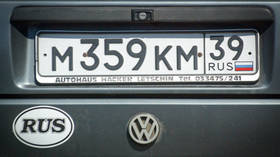Another EU state joins ban on Russian cars

Starting Wednesday, personal cars with Russian plates cannot enter Estonia. The prohibition is an enforcement measure for the EU’s sanctions on trade with Moscow.
Estonian Interior Minister Lauri Laanemets told the public broadcaster ERR that the purpose of the sanctions is to “force the aggressor nation to retreat to its borders,” and that the ban should help achieve that.
According to the report, people trying to drive into Estonia in a vehicle with Russian plates will have to turn back or leave the vehicle at the border. Vehicles already in Estonia will be allowed to leave.
The policy was introduced after discussions with fellow Baltic states Latvia and Lithuania on how to react to the guideline on sanctions enforcement that the European Commission released last Friday. The EU document clarified that prohibited items brought across the border for personal use – from private transport to mobile phones to even shampoo and toilet paper – are subject to sanctions and should be confiscated.
The Baltic countries have agreed to a standard policy, though Lithuania has made an exception for cars transiting through its territory to the Russian exclave of Kaliningrad.
An update on Monday said goods such hygiene products and clothes worn by travelers “raise insignificant circumvention concerns,” so customs authorities should target them in a “proportionate and reasonable manner.” The explanation stated that vehicles, on the other hand, require “particular attention” for possible sanctions-dodging. Instructions for electronic devices were not included.
Moscow’s Foreign Ministry spokeswoman Maria Zakharova has blasted the EU policy as showing “racism.” The country’s acting customs chief, Ruslan Davydov, has also described it as “total lawlessness” that “can only invoke regret and incomprehension.”













